Travel To Cuba From The US – The Complete 2024 Guide
Can US citizens travel to Cuba? Is it possible to travel to Cuba from the US with a foreign passport? What do you need to travel to Cuba from the US? Is it legal? Our friends asked us when we returned from Cuba. Yes, it’s possible. It’s legal, and in this guide, we will explain to you, step by step, how to plan a trip to Cuba if you are an American citizen or you want to fly to Cuba from the US.
We love Cuba, we were in Cuba 3 times so far. Of course, we love the vibes, the joy, Cuban culture, the architecture, old cars, and rum cocktails. So, we explain how 12 categories of authorized travel to Cuba work. What does it mean “support for the Cuban people”? Moreover, what currency to take to Cuba? How does money exchange work in Cuba? What is a Cuban Tourist Card (Cuban visa), and do you need it? Where to stay legally in Cuba, and how do “Casas particulares” work? And even more.
Disclaimer: This article is NOT an official guide on how to travel to Cuba – it’s a simple description of our experience gained on trips from the USA. We are not responsible for any of your decisions based on this post’s content. This is only for educational purposes and sharing travel experiences. Please do not use it as your only guide – always consult proper law and stay legal! If you think that any part of this post is not accurate or misleading, please drop us a message, and we will fix it immediately.
This article may contain affiliate / compensated links. For full information, please see our disclaimer here.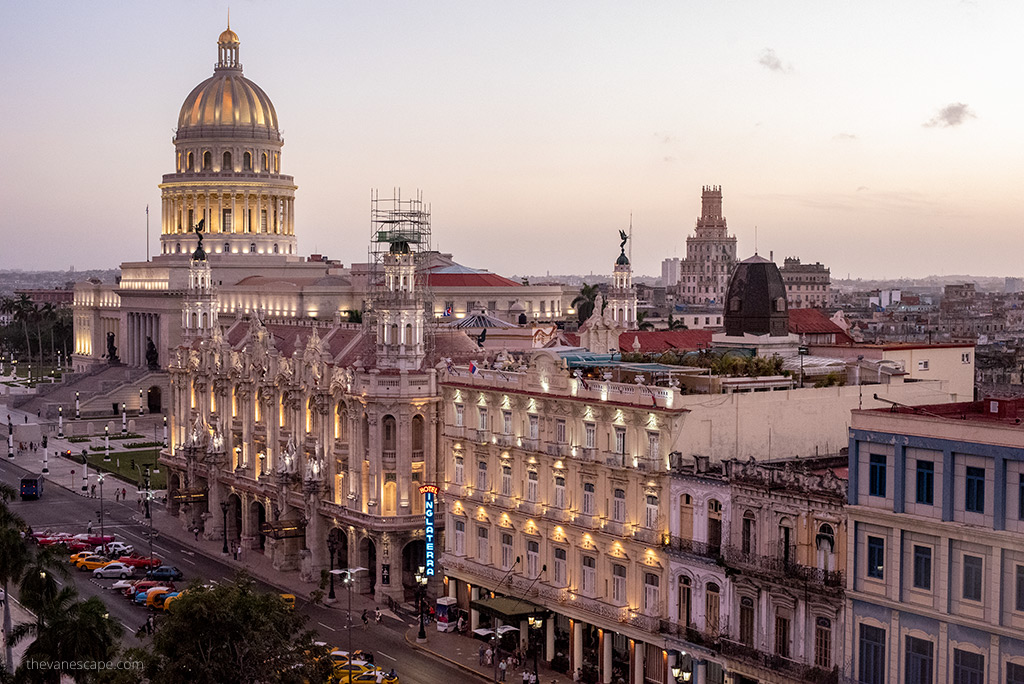
How to Travel to Cuba in 2024
Is it legal for a US citizen to travel to Cuba? Can a US citizen plan a trip to Cuba independently without booking through a travel company? If you are an American citizen, you can still travel to Cuba legally, even after the recent 2019 Cuba travel restrictions. As a US citizen, you must declare your reason for traveling to Cuba. There are 12 categories of approved travel to Cuba for Americans, all of which allow you to travel to Cuba legally.
You can travel to Cuba as an individual by traveling under a category called “Support for the Cuban people.” We give you all the details you need to plan a trip to Cuba, taking into account applicable regulations.
However, before you go to Cuba, check out the U.S. Department of State’s actual regulations. Persons subject to US jurisdiction will now be prohibited from engaging in certain direct financial transactions with entities and subentities identified by the State Department on the Cuba Restricted List.
12 Categories of Authorized Travel To Cuba
First of all, American citizens and non-American citizens traveling from the US to Cuba for tourist activities remain prohibited by statute. However, the Department of Treasury’s Office of Foreign Assets Control (OFAC) has issued general licenses for 12 categories of travel. Individuals who meet the regulatory conditions of the general license they seek to travel under do not need to apply for an additional license from OFAC to travel to Cuba.
So, your visit should match one of the categories below to stay legal. Furthermore, the most popular category for independent travel to Cuba from the US is Support for the Cuban people. The travel category is self-declared. There’s no license to apply. You agree to the category and are bound by its rules on the honor system. When you buy a plane ticket, the airline will ask you to select the reason for your visit.
The 12 categories of authorized travel to Cuba are:
- Family visits.
- Official business of the U.S. government, foreign governments, and certain intergovernmental organizations.
- Journalistic activity.
- Professional research and professional meetings.
- Educational activities.
- Religious activities.
- Public performances, clinics, workshops, athletic and other competitions, and exhibitions.
- Support for the Cuban people.
- Humanitarian projects.
- Activities of private foundations or research or educational institutes.
- Exportation, importation, or transmission of information or informational materials.
- Certain authorized export transactions.
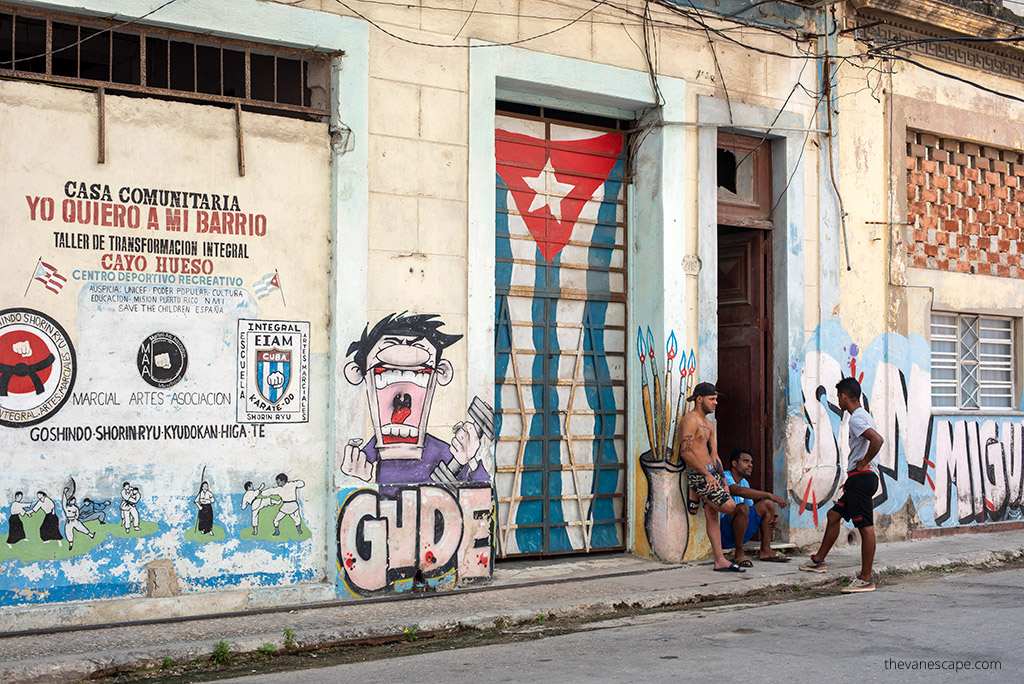
What does it mean: Support for the Cuban people?
Support for the Cuban People is meant to enable independent travelers to support the Cuban populace. You can go to Cuba on your own, as long as you follow the guidelines for the category. A traveler is required to provide support for the Cuban people and promote independent activity intended to strengthen civil society in Cuba.
It means that you must support the people of Cuba above all, NOT the Cuban government.
How to do it? The best idea is by staying in privately owned homes (known as casas particulares) rather than government-owned hotels. Furthermore, there is a list of banned hotels; it’s not allowed for American citizens to stay. While at the casa particular, engage the Cuban host to learn about Cuban culture.
You can book “Casas particulares” by Airbnb.com, which is legal (but you must declare one of the 12 categories as well).
Types of activities which means “Support for the Cuban People”
Moreover, you should visit Cuban-owned businesses, run by self-employed Cubans (cuentapropista), and having a “full schedule” of activities that put you in contact with locals.
So, your everyday program should promote independence for the Cuban people and should be complete with meaningful interactions with the Cuban people. The category is broad, so it depends on your interests, how you like to spend your time. You must retain records, like receipts and itineraries, and keep them on hand for five years. You must avoid all transactions with a GAESA-owned (military-owned) business.
These types of activities which means “Support for the Cuban People” include:
- Meeting with local artists, tobacco manufacturers (e.g. in Viñales Valley), and people who own their own business.
- Visit Independent markets.
- Take Dance Classes (popular and folkloric dances, as salsa, rumba).
- Meeting and engaging with musicians at a show.
- Art shows, learn about Cuban culture.
- Discuss Cuban society with locals, support civil society in Cuba.
What to do to support Cuban people?
Summarizing, to support Cuban people you should enhance contact with the Cuban people, support civil society in Cuba, or promote the Cuban people’s independence from Cuban authorities. So:
- Stay at a casas particulares (which can be booked via Airbnb.com) and discuss with your host, learn about Cuban culture.
- Eat at local restaurants or paladares (a paladar is an independent restaurant run by individual entrepreneurs, not by the Cuban government).
- Support civil society in Cuba, engage with local businesses and independent entrepreneurs like artists, musicians, food vendors, etc.
- Avoid transactions at military-owned businesses/government-owned businesses. Check the Cuba Restricted List, before you go.
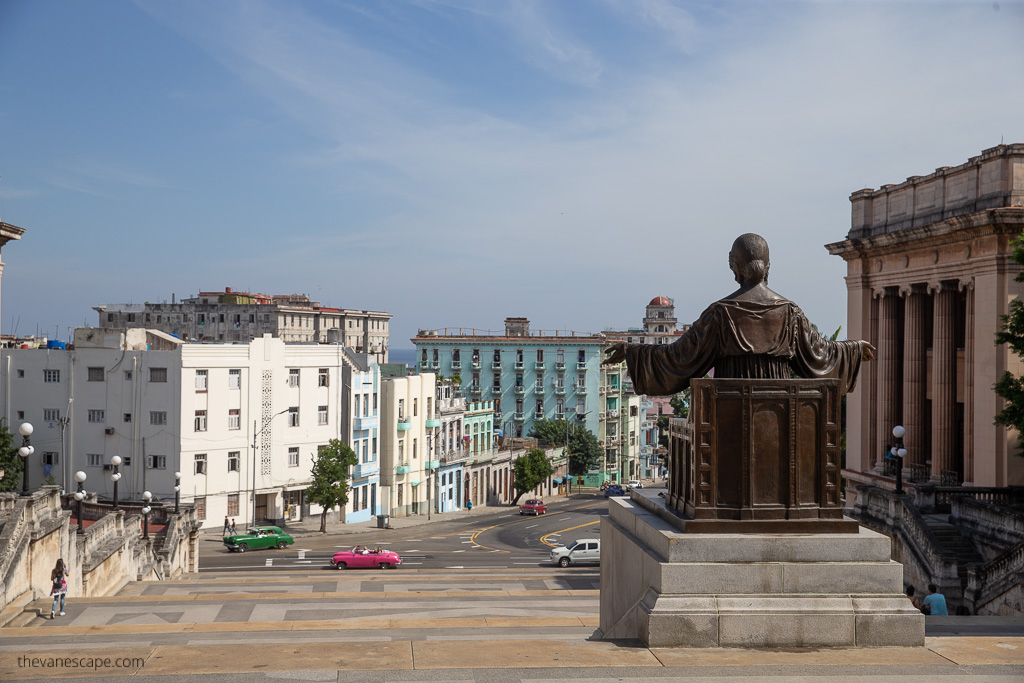
The Cuban Tourist Card / Cuban Visa Process
You must buy a Cuban Tourist Card to enter Cuba. There is not a Cuban visa, though the two words are sometimes used interchangeably. So, you need a Cuba Tourist Card. In most cases, you can purchase your Cuban Tourist Card from your airline before your flight.
Check with your airline for more information regarding pricing and where to buy. The price depends on the airline, and the average cost of Cuban Tourist Card is $50-$100 per Card. If you’re traveling from the US, this Cuban Tourist Card is pink. If you are going from outside the US, this Cuban Tourist Card is green.
That’s all; there is no Cuban visa process before entering Cuba. To make sure, visit your country’s Cuban Embassy. Prices vary depending on the embassy/consulate.
Travel Insurance to Cuba
If you plan a trip to Cuba, don’t forget about Travel Insurance. Because travel insurance to Cuba is mandatory, and you won’t be allowed through immigration without it. Health services in Cuba differ significantly from the American or European level, so be sure to buy the right travel insurance to Cuba. You can often buy it with your airline ticket.
Cuban Money
Cuban Currency
There are 2 Cuban currencies: the Cuban Peso Nacional (CUP) and the Cuban Convertible Peso (CUC).
The Cuban Peso Nacional (CUP) is the Cuban national currency, used primarily by locals in Cuba. The exchange rate fluctuates but is typically around 24-25CUP per $1USD. It is a good idea to exchange a little bit of money into CUP (Cuban peso). As a traveler, you might use a CUP for street food, small markets, taxi colectivos, and local restaurants.
The Cuban Convertible Peso (CUC) is the currency used in the tourism industry, and as a traveler you will need CUC the most. The exchange rate for CUC is pinned to the US Dollar, which means 1CUC equals 1USD. So, most restaurants, bars, museums, taxis, stores, souvenir shops, lodging, and tourist transportations only take CUC. Moreover, everyone accepts CUC. So, you may get change back in CUP. Due to it, exchange most or all of your cash into CUC.
Exchanging Money In Cuba
The Cuban government requires that travelers declare cash amounts over 5,000 USD. Note that there’s a 3% exchange fee on all currencies and additional a 10% tax on US currency only. So while the exchange rate between CUC and USD is 1:1, you’ll only get 87 CUC for every $100 USD you bring.
This does not apply to electronic transactions or cash conversions in other currencies. So, what currency to take to Cuba? One tactic is to bring Euros, Canadian dollars or Mexican Pesos if you have access to that before your trip. Always check the amount of Cuban currency you receive. Go to major hotels or BFI and Banco Metropolitano banks to exchange your money safely.
The export of Cuban convertible pesos (CUC) to the US is strictly prohibited, regardless of the amount. So, when departing Cuba, exchange Cuban convertible pesos (CUC) back to US Dollars well before reaching airport security checkpoints to avoid potential confiscation of the CUC. In Havana airport, it’s tough to pay with CUC (most places accept only USD and CUP).
American credit & debit cards
U.S. credit and debit cards generally do not work in Cuba. So, bring enough cash to last your entire trip. US Dollars can be exchanged into Cuban convertible currency (CUC) at airport, major hotels, and exchange offices.
Other credit & debit cards
There is a problem with card payments, not only from American banks. No matter how many cards you have, if you plan a trip to Cuba, take cash. Unfortunately, Cuba is a slow-developing country because of its politics. And you will pay by cards only in exclusive hotels and restaurants. You will not pay by cards at most local Cuban restaurants, small shops, etc. So, you will not support the Cuban people. There are no payment terminals. So, take cash if you want to help them and be lawful.
ATM Cuba
ATMs will not accept American debit cards, too. So if you have an American cards take enough cash with you. The same goes for all Mastercard debit cards, regardless of country of origin.
But Visa debit cards associated with a non-US bank are accepted at ATMs. However, it often happens in Cuba that there is no money in ATMs, and there are long lines to ATMs. For safety reasons, we used the Revolut card during a recent trip. Finally, you will be charged a 3% processing fee whenever you take out money with a debit card or exchange cash directly.
How much money do you need?
It’s a difficult question and depends on your needs and style of travel. But it’s better to take more cash. Prices are very different depending on the place. There are some sample prices from our last stay in February 2020 below.
- taxi from/to the airport 25 CUC
- shared taxi from Havana to Vinales (go&back) for five persons – 180 CUC
- one way bus from Havana to Trinidad for one person – 27 CUC
- bottled water 1-2 CUC
- cocktail on rum: daiquiri, mojito, cuba libre 2.5 – 7 CUC (7 on the best rooftop bars in Havana)
- beer 2-3 CUC
- coco 1-2 CUC
- pizza 5-15 CUC
- Cuban sandwich 3-7 CUC
- breakfast 4-5 CUC per person
- lunch at a local restaurant 2-5 CUC per person
- lunch in an elegant restaurant 15-25 CUC per person
- dinner in an elegant restaurant 20-50 CUC per person
- fridge magnet 1-2 CUC
- cuban hat 5-25 CUC
- bottle of rum 5-20 CUC
- one piece of cigar 2-50 CUC
- painting by a local artist 300-600 CUC.
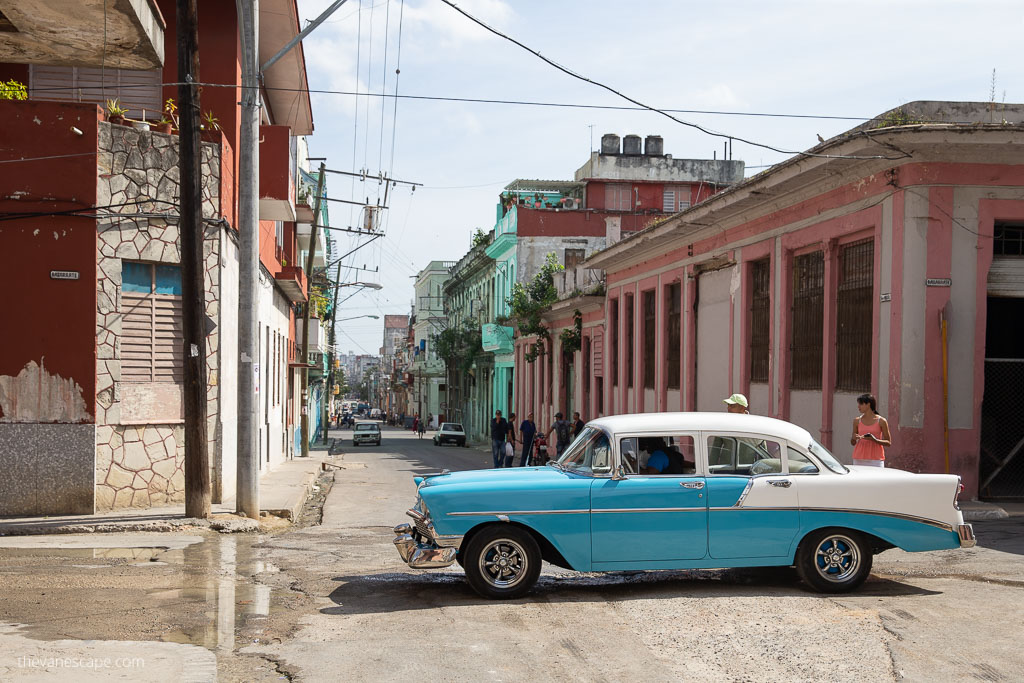
Where to stay in Cuba
Casas Particulares
Casas particulares are the best, the most authentic places to stay in Cuba. Because you stay with Cuban people, and you support them this way. You can rent a room or independent apartment directly from the Cuban family. So, you can see and feel what Cuban people live like.
Moreover, you can chat with your host and support civil society in Cuba. The host may offer you fresh breakfasts or traditional Cuban food. Finally, casas particulares hosts give you hints on what to do, where to eat, and where to go shopping to support the Cuban people.
We stayed at casas particulares in Havana, Trinidad, Vinales, Cienfuegos. We love this type of accommodation. It lets you meet Cuban people, listen to their stories, and hardships. We could tell them about democracy development in Poland, and they were happy to hear how it works after communism collapsed.
Thanks to the lodging in casas particulares, we have also improved our Spanish. It is worth knowing the basic phrases in Spanish and taking a dictionary with you because your host does not always have to understand English.
However, you must know that the standard of casas particulares varies. Cuba is a developing country. In Havana, especially, the gap between poverty and luxury is vast. There is a problem with running water. Moreover, very often, there is no hot water. However, it is so hot in Cuba that showering in lukewarm water is a pleasure.
There is no internet in private homes (we will discuss this in the next chapter). Finally, there are no elevators in tenements. However, we booked beautiful, spacious, and stylish apartments via Airbnb.com. In the next article, we will show you the best places to stay in Cuba.
Hotels in Cuba
Of course, you can stay at the hotel if you wish. We stayed in hotels in Havana and Varadero during our first visit. Moreover, the hotels in Cuba are beautiful, especially those in Havana. We visited most hotels with rooftop bars in Havana. So, check our article about the best rooftop bars in Havana, please. Our favorites hotels in Havana are Saratoga Hotel, Iberostar Parque Central, and SO/Havana Paseo del Prado Hotel.
However, if you are a US citizen before you book a hotel in Cuba, check if it is not on the restricted list.
Internet and WiFi In Cuba
You may also be interested in internet access to Cuba before making a trip decision. Despite popular opinion, there is some internet access in Cuba. However, if you work remotely, it can be difficult in Cuba. For many years Cuban people have no internet connections. They were isolated. It changed over last years. But, the government does censor some websites.
You can get connected through Cuba’s state-run ETECSA telecom company. As a traveler, you can buy ETECSA prepaid wifi cards at special kiosks. You need your passport or ID. Buying a maximum of 3 cards per person per day is possible. 1 card = 1hour = 1 CUC (Ferbuary 2020. Two years before, it was only possible for travelers to buy 1 card for 1 hour per day officially, so it is progress).
These cards provide a username and password for ETECSA Wi-Fi networks. You can find them at major hotels or in public parks around the country. If you need more cards, you can buy them from locals in the parks or at a hotel front desk for about $6 per one-hour card.
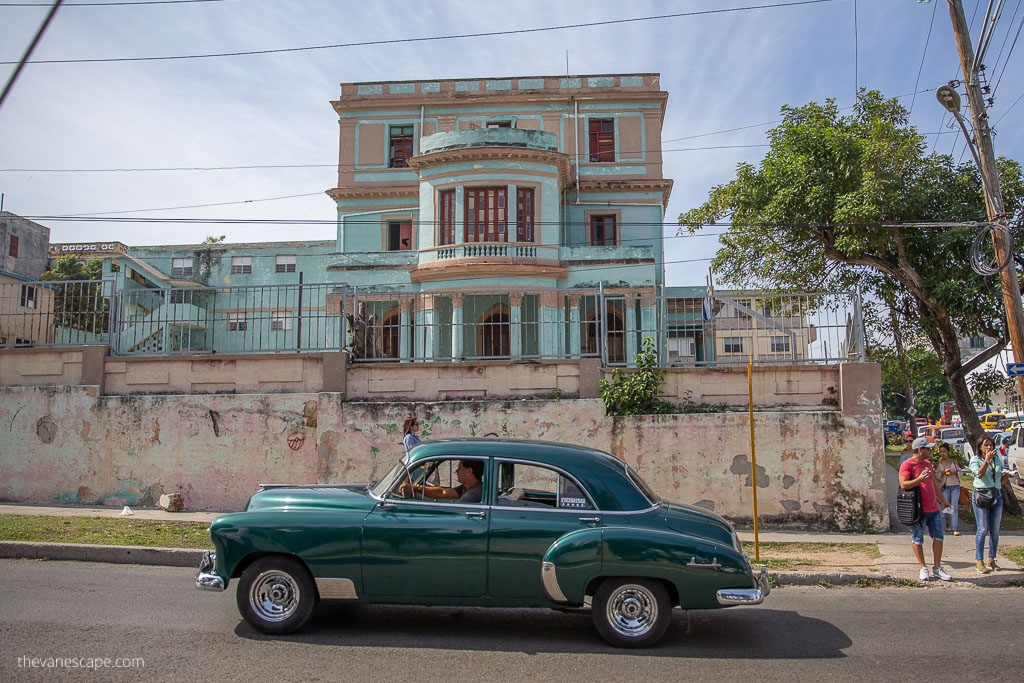

When I read the phrase “support for the Cuban people”, I instantly thought that it would be a government program. Find it refreshing that it’s not. Casas particulares seems like a great idea. Ido the same when I visit different countries. Airbnb has surely made things easier.
I have been wanting to travel to Cuba for a long time, maybe because the similarities between Cuba and my country – Romania (post communist). However, because Cuba is on the other side of the ocean, I kept putting it of. I was surprised to read they have so little internet. I was pretty sure that they are more developed, but it’s always good to hear the last news from someone who went there.
Great guide on visiting Cuba! I didn’t realize there were restrictions on where you could stay! I do love the idea of staying with a local by using Airbnb. Cuba is so gorgeous and I’m looking forward to exploring Cuba more!
Even
though I’m European, I found this to be a detailed and well written guide. Cuba
is definitely somewhere I’d like to visit, and I may be transiting through the
US.It’s so useful to know about the categories: I think I would also fall under the ‘support the Cuban people’ category. It’s also good to know I can use my Euros here; the currency situation in Cuba is very confusing!
Great post, so informative! I have been wanting to visit Cuba for so long and was devastated when I heard about the additional travel restrictions that were put into place. It is great to know that travel to Cuba is still possible and knowing how to word it correctly to ensure I don’t run in to any issues will be very helpful. Saving this post for future reference. Thank you!
I never been to Cuba, however I would love to visit this place because of its unique culture, the foods, music, and those vintage cars! I only know Cuba from many movies, and I think it is a lovely place. Hope in the future, we can make it happen.
Thank you for posting this! Honestly, I feel that there has been so much confusion surrounding travel to Cuba for Americans. Can we go? Can we not? What do the restrictions even mean? All of this felt like such a headache and really dissuaded me from wanting to visit. I’m so glad I got to read through this and finally understand what the heck this all means, as well as better understand things like cost because I know credit cards are not widely accepted. This is such a great and comprehensive post, awesome!
Cuba, what a fascinating country! I’ve been there once a few years ago and I had a great time. I stayed in casas particulares and moved from one place to another aboard those beautiful vintage cars. I like your section about costs, it’s very useful when putting together the budget for the trip.
Oh wow! I didn’t realize that you had to have a specific reason to go to Cuba. I’ve never been, but I would love to head there. I wonder if writing or blogging would be considered journalism.
As Canadians, we can travel quite freely to Cuba. It has been a sun and beach vacation spot for us several times. But our last visit was a multi stop visit by cruise ship. That was great to see more of the country. We understand that it is much more difficult for others and that the requirements continue to change. I think that visiting the support the Cuban people is a great way to visit. And learn so much more about the culture and history.
As Germans we easily get a visa for Cuba. And actually we have been thinking of a visit in January/ February 2023. Also we have a European Visacard, I would take a lot of cash. Just in case the ATMs are not working with my card.